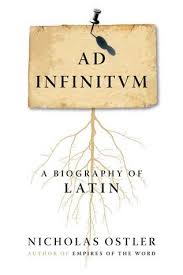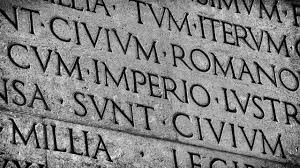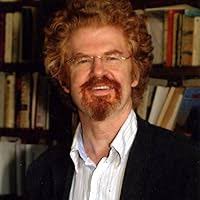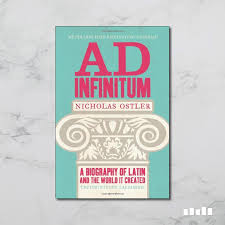Ad Infinitum: A Biography of Latin (2007) by Nicholas Ostler
Good Reads meta-data is 382 pages, rate 3.77 by 455 litizens.
Genre: History (not biography)
DNA: Linguistics.
Verdict: Granite.
Tagline: Vivos lingua mortua.

A zombie language, Latin has had a long half-life. As late as 1840 it was the legal language of the political assembly in Hungary. It remains the common language among scientists well into the Twenty-first Century and that fact lives on in the Latin names for plants and animals, including our bones. Law schools test graduates on the use of Latin tags. In these ways, and a few others, it remains a universal language. Sort of.
In one of Ben Pastor’s World War II novels The Road to Ithaca (2017) an English prisoner want to tell a German officer something dark and deep but it is impossible to do so without being overheard, and so he tries Latin…and it works.
Presidents of the European Union have, at times, communicated in Latin so as not to favour any one language of the Union. To wit, a recurrent Finn in that office issued weekly summaries in Latin, thereby employing Latin scholars who had no students. Perhaps somewhat in jest, two, at least, of the Harry Potter’s tales have appeared in Latin translations.
In the Sixteenth Century Renaissance the tiny educated minority of men in Europe had a common language, Latin. Erasmus from Holland, Thomas More from England, Niccolò Machiavelli from Italy could have all talked or corresponded in Latin.
Or could they? Did they have regional accents that limited comprehension? Did they all use the same syntax? German, Danish, and Dutch all evolved from the same Frisian core and geographically they are much closer to each other than the far flung Latin speakers, but they are not one language. Did Dutch Latin, English Latin, and Italian Latin have similar differences? Then there was the Latin exported to the elites on the edges of the Empire in the Levant, or the North Africa of St Augustine, or Scots borderlands, or the Black Sea shore. I found no answer in these pages.
Thomas Hobbes translated his book the Leviathan into Latin to insure its immortality, he said. He had learned this from his employer Francis Bacon who wrote in English but had all of books translated into Latin to reach world’s learned readers.
Much of the history of Latin is the history of Rome from Republic to Empire to its long decay. Though curiously enough Latin did not always rule the roost in Rome itself where one important sign of distinction was to speak Greek. Even in Cicero’s day as the Republic became the Empire, Greek was still the preferred language of the Senators who killed Caesar. In his exile Cicero literary efforts were animated partly by the goal of making Latin into a contemporary language. Huh?

In the Eastern Roman Empire of Byzantium Greek was the language of culture and power, but even so, that European toe of contemporary Turkey was and is called Rumi for Roman.
Emerging in Latium, Latin was the language of farmers with a rich vocabulary, mainly descriptive, for that bucolic life. Poets long found it good for a pastoral celebrations of sights and sounds. But it lacked the abstract and conceptual registers of Greek, and these Cicero and others later set out to rectify. The pendulum swung too far and for hundreds of years Latin became ever more elaborate, ornate, and rhetorical until the foliage overgrew the meaning.
When Latin became the language of the Christian faith an effort was made to reverse engineer it, to simplify it so that believers could understand the services, the spoken texts, and the sacraments. Ironic then that today Latin remains the language of Catholicism but the few if any of its followers understand the language now. Protestantism spoke the vernacular when it split from Rome.
The spread of Christianity travelled down Roman roads and was communicated in the language that the Romans had sown far and wide, but farther and wider in the West than in the East where Greek hung on as the language of the literate and the earliest Bibles.
Though Roman roads carried Latin, the Roman Republic and Empire made no effort to sow its language. Where Rome ruled administration, law, army, and tax was conducted in Latin but there was no requirement of any local person to learn it. The author makes a distinction, which eludes me, between Romance as the everyday languages of the Empire and Latin. Best I can fathom is that Romance was like Chinenglish, Singleish, or Franglais, a miscegenation of Latin and the local vernacular, and so it varied for one place to another, spawning the family of Romance Languages.
Latin was never the universal language of humanity, despite many claims to that effect, because much of the world never learned it in Asia and sub-Sahara Africa. By the way, it was exported into Latin America, and had takers up north, too.
It was also gendered in that during the long history recounted in this book, few women learned it and fewer still used it. It was a male prerogative, though the author pays due respect to some few exceptions. Ergo, the Liberal Arts were the arts a free man was to learn to value, use, and keep that freedom. Down my long bow I see a connection between the decline of liberal arts and the rise of general ignorance that now sweeps across many lands.
Why is it called Latin and not Roman? It is a good question that the author raises but cannot answer.
From Cicero on Latin modelled itself on Greek, and in the forensic investigation of Greek gave birth to the concept of grammar. Centuries later this notion of an underlying structure would emerge in all those books or rules and usage.
***
The book is replete with interesting tidbits of information but the prose is hard and far too technical for this reader, contrary to the newspaper blurbs quoted on the back cover. I also detected the shadowy presence of Noam Chomsky, which I always find distasteful.

If there is the appetite, this author has several other books on language.

